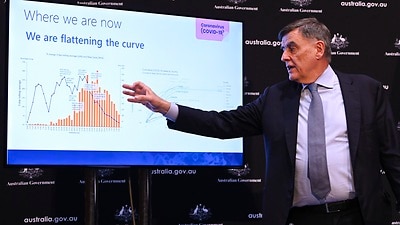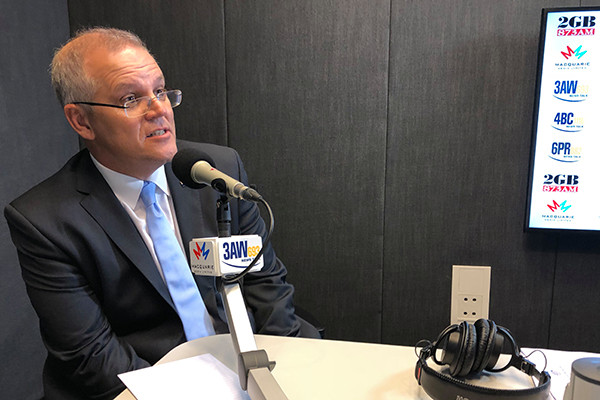
Chief Medical Officer Brendan Murphy seems confused by numbers, to a point where he is slowly but surely revealing his poor errors
Chief Medical Officer Brendan Murphy has been reported telling a Senate Inquiry:
If we had their (the UK's) death rate and outcomes , we would've had about 14,000 deaths in Australia, not just over 100........ so I think we have done well, we are in a very cautious phase now of trying to move to a living-with-COVID economy."
Based on Murphy's advise the Morrison Government put the economy into lockdown, at a cost to taxpayers of between AUD 200-AUD 300 Billion. Morrison's DPMC's Value Of Statistical Life Guidelines provide that the government can spend about $4.2 Million to save a life. The government does not have a blank cheque, contrary to popular belief.
Rounded up to $ 5 Million taxpayers would have expected that the government intended that 40,000-60,000 lives needed to be saved.
Saving 14,000 lives should have cost approximately $ 70 Billion, which is THREE TO FOUR TIMES LESS than what has been incurred.
Put in another way, the number of lives that needed saving was just above FOUR TIMES LESS than budgeted.
For all this, the person who must bear blame is Brendan Murphy. As reported on this blog, in early to mid January when he should have acted but did nothing, Murphy seemed more interested in playing at being human rights commissioner.
He seems to have then been over-cautious in his advice to government, causing a loss to taxpayers of more than $130 Billion to $ 180 Billion. The cost to the economy as a whole is far greater, and still being tallied.
TO BE READ WITH
Monday, April 6, 2020
Australia's COVID 19 policies based on modelling that ignores financial costs -Govt seems clueless as to how many lives will be saved in relation to its economy crushing policies
by Ganesh Sahathevan
Australia's Chief Medical Officer Brendan Murphy says modelling shows social distancing and hygiene measures are "flattening the curve". Source: AAP
Australia's Chief Medical Officer Brendan Murphy says modelling shows social distancing and hygiene measures are "flattening the curve". Source: AAP
Murphy has recommended policies intended to limit community contagion, but in January insisted that there was little if any risk of community contagion in Australia.
The Australian Government has at least released the modelling that is guiding its COVID 19/Wuhan Virus response, which has caused the economy to collapse.
As before, the modelling makes no mention about the benefits to the whole of the population in the long term. The Government seems to have ignored its own cost guidelines, set out on the Department Of Prime Minister And Cabinet website, which effectively value an Australian life, on average, at $4.2 Million.
It does now seem as if the Government has allowed itself to spend as much it wants, without any regard to the number of lives that might actually be saved.
END
TO BE READ WITH
Is an Australian life still worth AUD 4.2 Million? Forced shuttering of businesses, massive job losses, loss of wealth implies life is now worth less; Morrison Govt duty bound to ask taxpayers first before spending another cent on its Wuhan Virus stimulus
60,000 lives saved in the present time: Morrison Government's likely estimate of lives saved by his lockdown may be an acceptable lossApril 02, 2020
The Australian Government has at least released the modelling that is guiding its COVID 19/Wuhan Virus response, which has caused the economy to collapse.
As before, the modelling makes no mention about the benefits to the whole of the population in the long term. The Government seems to have ignored its own cost guidelines, set out on the Department Of Prime Minister And Cabinet website, which effectively value an Australian life, on average, at $4.2 Million.
It does now seem as if the Government has allowed itself to spend as much it wants, without any regard to the number of lives that might actually be saved.
END
TO BE READ WITH
Is an Australian life still worth AUD 4.2 Million? Forced shuttering of businesses, massive job losses, loss of wealth implies life is now worth less; Morrison Govt duty bound to ask taxpayers first before spending another cent on its Wuhan Virus stimulus
March 29, 2020
by Ganesh Sahathevan
Even the ABC is worried that things have changed
forever
An Australian life is worth $4.2 Million. That is the value of a statistical life, or the offical rate that guides Government policy in for example, the cost of the stimulus and other measures that the Morrison Government is implementing to manage the economic impact of its Wuhan Virus/Covid-19 mitigation measures.
The concept is summarised on the Commonwealth Department Of Prime Minister And Cabinet
website:
Key Points:
• Willingness to pay is the appropriate way to estimate the value of reductions in the risk of physical harm – known as the value of statistical life.
• Based on international and Australian research a credible estimate of the value of statistical life is $4.2m and the value of statistical life year is $182 000 in 2014 dollars.
• There are complicating assumptions used to derive these estimates so a sensitivity analysis should be undertaken as part of the cost-benefit analysis.
Based on the above , it can be roughly estimated that Australians are prepared to pay, or rather let their government pay on their behalf, say $420 Billion to save 100,000 lives. This is the estimate that the Government ought to be relying on to determine the size of its Covid 19 economic and health package.
However, the Australian Government led by Scott Morrison has imposed on the country what is in effect a ban on trade, which it refers to as "hibernation".
In real terms there has been a forced shuttering of businesses, massive job losses and generally a loss of wealth. Consequently it is likely that the willingness to pay is now less than that $4.2 Million.
Put in another way, the ability to pay has fallen drastically, and that is more likely than not to have adversely affected the willingness to pay.
The Morrison Government is duty bound to ask taxpayers first before spending another cent on its Wuhan Virus stimulus. and on the health measures.
END
Even the ABC is worried that things have changed
forever
An Australian life is worth $4.2 Million. That is the value of a statistical life, or the offical rate that guides Government policy in for example, the cost of the stimulus and other measures that the Morrison Government is implementing to manage the economic impact of its Wuhan Virus/Covid-19 mitigation measures.
The concept is summarised on the Commonwealth Department Of Prime Minister And Cabinet
website:
Key Points:
• Willingness to pay is the appropriate way to estimate the value of reductions in the risk of physical harm – known as the value of statistical life.
• Based on international and Australian research a credible estimate of the value of statistical life is $4.2m and the value of statistical life year is $182 000 in 2014 dollars.
• There are complicating assumptions used to derive these estimates so a sensitivity analysis should be undertaken as part of the cost-benefit analysis.
Based on the above , it can be roughly estimated that Australians are prepared to pay, or rather let their government pay on their behalf, say $420 Billion to save 100,000 lives. This is the estimate that the Government ought to be relying on to determine the size of its Covid 19 economic and health package.
However, the Australian Government led by Scott Morrison has imposed on the country what is in effect a ban on trade, which it refers to as "hibernation".
In real terms there has been a forced shuttering of businesses, massive job losses and generally a loss of wealth. Consequently it is likely that the willingness to pay is now less than that $4.2 Million.
Put in another way, the ability to pay has fallen drastically, and that is more likely than not to have adversely affected the willingness to pay.
The Morrison Government is duty bound to ask taxpayers first before spending another cent on its Wuhan Virus stimulus. and on the health measures.
END
60,000 lives saved in the present time: Morrison Government's likely estimate of lives saved by his lockdown may be an acceptable lossApril 02, 2020
by Ganesh Sahathevan

Morrison seems to be speaking of lockdowns of three, six, twelve months and more as if Australians
have an infinite capacity to pay
The Morrison Government's $265 Billion stimulus package may be based on the premise that Australian are prepared to spend $ 4.2 Million each, on average, to save an additional life.
(see explanation below).
The workings are straight forward, but Morrison has not been prepared to state the number.
Meanwhile, despite the stimulus, earnings from work and business are evaporating; when that happens the value of life is likely to decline.
When that happens Australians will the expect number of lives saves to be higher; so for example if the value of life falls to $2.1 Million, Australians would expect 120,000 lives to be saved. Anything less would be considered an acceptable loss.
Additionally, the the cost to the taxpayer may well be in excess of the $ 265 Billion stimulus for despite the stimulus earnings from work and business are evaporating.
Here again, a loss of 60,00 lives among those who are older or have underlying conditions would be considered an acceptable loss.
What is or is not an acceptable loss is a decision for us to make, not the Prime Minister and his " war time" Cabinet. Ultimately it a decision for taxpayers, not the PM and his Government.
END

Morrison seems to be speaking of lockdowns of three, six, twelve months and more as if Australians
have an infinite capacity to pay
The Morrison Government's $265 Billion stimulus package may be based on the premise that Australian are prepared to spend $ 4.2 Million each, on average, to save an additional life.
(see explanation below).
The workings are straight forward, but Morrison has not been prepared to state the number.
Meanwhile, despite the stimulus, earnings from work and business are evaporating; when that happens the value of life is likely to decline.
When that happens Australians will the expect number of lives saves to be higher; so for example if the value of life falls to $2.1 Million, Australians would expect 120,000 lives to be saved. Anything less would be considered an acceptable loss.
Additionally, the the cost to the taxpayer may well be in excess of the $ 265 Billion stimulus for despite the stimulus earnings from work and business are evaporating.
Here again, a loss of 60,00 lives among those who are older or have underlying conditions would be considered an acceptable loss.
What is or is not an acceptable loss is a decision for us to make, not the Prime Minister and his " war time" Cabinet. Ultimately it a decision for taxpayers, not the PM and his Government.
END




 Jessica Rudd and Albert Tse in Shanghai. Picture: Daniele Mattioli
Jessica Rudd and Albert Tse in Shanghai. Picture: Daniele Mattioli







